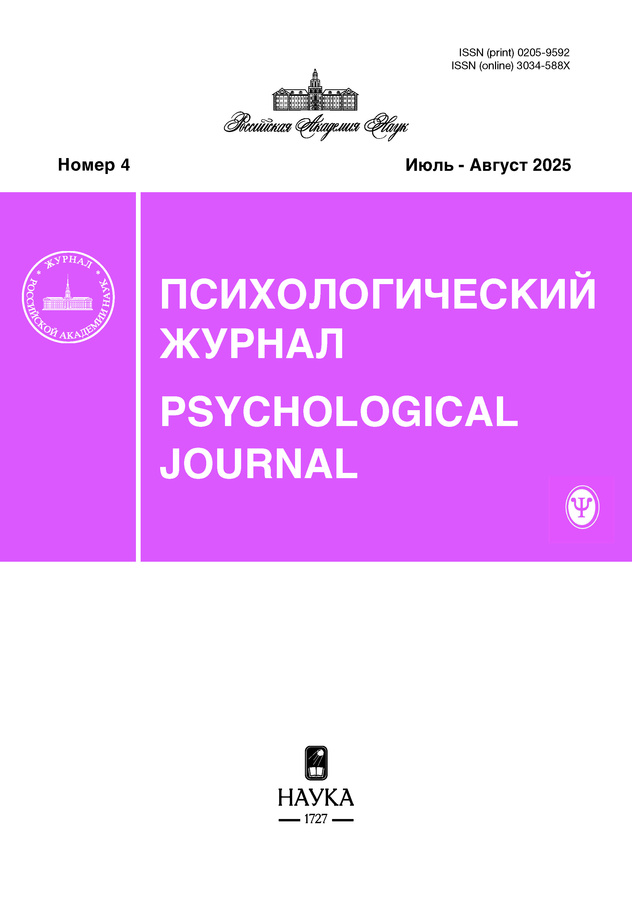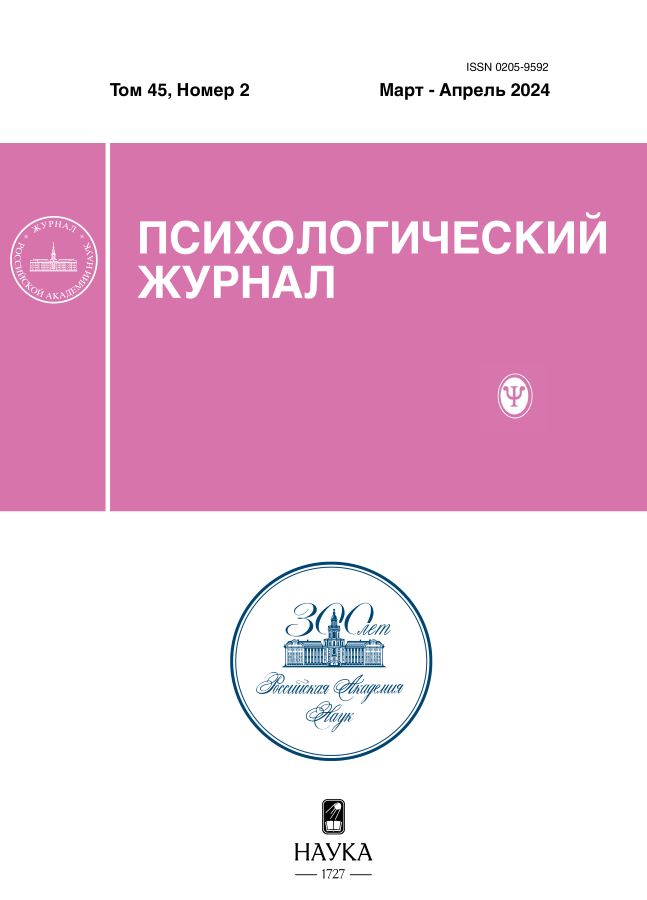Когортные различия в выполнении теста интеллекта: эффекты начального школьного обучения и сложности заданий
- Авторы: Тихомирова Т.Н.1, Малых С.Б.1
-
Учреждения:
- Федеральный научный центр психологических и междисциплинарных исследований
- Выпуск: Том 45, № 2 (2024)
- Страницы: 28-38
- Раздел: Когнитивная психология
- URL: https://cijournal.ru/0205-9592/article/view/660961
- DOI: https://doi.org/10.31857/S0205959224020032
- ID: 660961
Цитировать
Полный текст
Аннотация
Представлены результаты анализа когортных различий в выполнении теста “Стандартные прогрессивные матрицы” за одно десятилетие. В фокусе исследовательского внимания оказываются показатели выполнения теста флюидного интеллекта 1008 школьниками шести когорт по рождению, поступившими в первые классы одной общеобразовательной организации с 2011 по 2017 г., и их результаты через четыре года начального школьного обучения — с 2015 по 2021 г. Решаются задачи, связанные с определением характера когортных различий в тестовых баллах “внутри” одного десятилетия на первом и четвертом годах обучения, вероятностью изменения размера когортных различий в ходе начального школьного обучения и степенью их зависимости от сложности тестовых заданий. Результаты исследования свидетельствуют о существовании когортных различий в выполнении учениками одной общеобразовательной организации теста интеллекта “внутри” одного десятилетия. При этом характер изменений не соответствует тенденции поступательного увеличения тестового балла от предыдущей когорты к последующей когорте. Величина когортных различий на первом и четвертом годах обучения варьируется в зависимости от сложности тестовых заданий, достигая максимальных значений для более сложных заданий. Показано, что четыре года начального обучения в школе существенно сокращают выраженность когортных различий по показателям теста “Стандартные прогрессивные матрицы”. При этом сложность тестовых заданий оказывается связанной с влиянием начального школьного обучения на когортные различия: чем сложнее задания, тем в меньшей мере сокращается величина когортных различий к концу начальной школы.
Полный текст
Об авторах
Т. Н. Тихомирова
Федеральный научный центр психологических и междисциплинарных исследований
Автор, ответственный за переписку.
Email: tikho@mail.ru
академик РАО, доктор психологических наук, ведущий научный сотрудник
Россия, 125009, г. Москва, ул. Моховая, д. 9, стр. 4С. Б. Малых
Федеральный научный центр психологических и междисциплинарных исследований
Email: malykhsb@mail.ru
академик РАО, доктор психологических наук, профессор, зав. лабораторией
Россия, 125009, г. Москва, ул. Моховая, д. 9, стр. 4Список литературы
- Равен Дж.К., Корт Дж.Х., Равен Дж. Руководство к прогрессивным матрицам Равена и словарным шкалам. Раздел 2: Стандартные цветные матрицы (включая параллельные версии теста): Пер. с англ. 2-е изд., стер. М.: Когито-Центр, 2009.
- Тихомирова Т.Н., Малых С.Б. Когнитивные основы индивидуальных различий в успешности обучения. М.-СПб.: Нестор-История, 2017. 312 c.
- Тихомирова Т.Н., Малых С.Б. Эффекты влияния макро- и микросредовых условий образования на когнитивное развитие школьников // Вопросы психологии. 2021. Т. 67. № 5. С. 30–43.
- Шадриков В.Д. Способности и одаренность человека. М.: Изд-во “Институт психологии РАН”, 2019. 274 с.
- Bratsberg B., Rogeberg O. Flynn effect and its reversal are both environmentally caused // Proceedings of the National Academy of Sciences. 2018. V. 115 (26). P. 6674–6678.
- Cahan S., Cohen N. Age versus schooling effects on intelligence development // Child Development. 1989. P. 1239–1249.
- Deary I.J., Weiss A., Batty G.D. Intelligence and personality as predictors of illness and death: How researchers in differential psychology and chronic disease epidemiology are collaborating to understand and address health inequalities // Psychological Science in the Public Interest. 2010. V. 11 (2). P. 53–79.
- Dutton E., Lynn R. A negative Flynn Effect in France, 1999 to 2008–9 // Intelligence. 2015. V. 51. P. 67–70.
- Dutton E., Lynn R. A negative Flynn effect in Finland, 1997–2009 // Intelligence. 2013. V. 41 (6). P. 817–820.
- Dworak E.M., Revelle W., Condon D.M. Looking for Flynn effects in a recent online US adult sample: Examining shifts within the SAPA Project // Intelligence. 2023. V. 98. P. 101734.
- Flynn J.R., Shayer M. IQ decline and Piaget: Does the rot start at the top? // Intelligence. 2018. V. 66. P. 112–121.
- Flynn J.R. The mean IQ of Americans: massive gains 1932 to 1978 // Psychological Bulletin. 1984. V. 95 (1). P. 29–51.
- Green K.E., Kluever R.C. Components of item difficulty of Raven’s matrices // The Journal of General Psychology. 1992. V. 119 (2). P. 189–199.
- Nisbett R., Aronson J., Blair C. et al. Intelligence: New findings and theoretical developments // American Psychologist. 2012. V. 67. P. 130–159.
- Parker K.C.H. Changes with age, year-of-birth cohort, age by year-of-birth cohort interaction, and standardization of the Wechsler Adult Intelligence Tests // Human Development. 1986. V. 29 (4). P. 209–222.
- Pietschnig J., Voracek M. One century of global IQ gains: A formal meta-analysis of the Flynn effect (1909–2013) // Perspectives on Psychological Science. 2015. V. 10 (3). P. 282–306.
- Pietschnig J., Deimann P., Hirschmann N., Kastner-Koller U. The Flynn effect in Germanophone preschoolers (1996–2018): Small effects, erratic directions, and questionable interpretations // Intelligence. 2021. V. 86. P. 101544.
- Platt J.M., Keyes K.M., McLaughlin K.A., Kaufman A.S. The Flynn effect for fluid IQ may not generalize to all ages or ability levels: A population-based study of 10,000 US adolescents // Intelligence. 2019. V. 77. P. 101385.
- Ritchie S.J., Tucker-Drob E.M. How much does education improve intelligence? A meta-analysis // Psychological Science. 2018. V. 29 (8). P. 1358–1369.
- Shakeel M.D., Peterson P.E. A half century of progress in US student achievement: Agency and Flynn effects, ethnic and SES differences // Educational Psychology Review. 2022. V. 34 (3). P. 1255–1342.
- Teasdale T.W., Owen D.R. Secular declines in cognitive test scores: A reversal of the Flynn Effect // Intelligence. 2008. V. 36 (2). P. 121–126.
- Tikhomirova T., Malykh A., Lysenkova I. et al. The development of number line accuracy in elementary school children: A cross-country longitudinal study // British Journal of Educational Psychology. 2023. V. 93 (2). P. 423–436.
Дополнительные файлы











